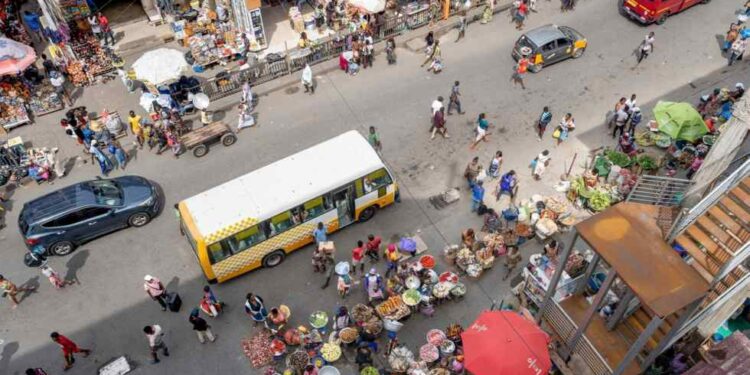Ghana default puts domestic debt ‘can of worms’ in the spotlight
When Ghana defaulted on its debts and reached a preliminary agreement on a $3bn IMF bailout last December, the world’s lender of last resort imposed many familiar conditions to get the country’s finances back on track.
One demand, however, was strikingly new, and analysts say it will change the debt landscape forever. The IMF said that before it asks its board to approve the support package, Accra must first address its domestic debts — money typically borrowed from local banks, pension funds and insurance companies.
“This has opened a can of worms, in Ghana and elsewhere,” said Thys Louw, emerging market debt portfolio manager at investment company Ninety One. “Every restructuring is going to have this issue hanging over it.”
The dilemma for governments is that as they fall into default they face a stark choice. If they force overseas creditors to shoulder all the pain, they risk losing access to foreign capital while struggling to restore their overall debt to a sustainable footing. Yet pushing losses on to domestic creditors risks wiping out local banks, pension funds and insurance companies.
The cost to taxpayers of recapitalising a banking sector can be more than the savings achieved through debt restructuring.
Debt deadlock
In Ghana, said Joe Delvaux, emerging markets distressed debt portfolio manager at Amundi, “if you just restructure the external debt, that’s not enough to get you back on a path to debt sustainability”.
Back in the late 20th century, when emerging markets suffered two decades of almost continuous debt crises, domestic debt was barely an issue. In fact, the lack of local debt markets was a serious concern.
Many countries had borrowed heavily by issuing bonds denominated in US dollars. These appealed to foreign investors because they shielded them from currency risk and other instabilities. For borrowers, they were cheaper than bonds issued at home, where lenders demanded compensation for risks such as high inflation.
But borrowing in US dollars left countries exposed to shocks beyond their control, as the 1980s and ’90s brutally illustrated in Latin America, Asia and elsewhere. In 1999, economists Barry Eichengreen and Ricardo Hausmann described reliance on foreign-currency financing as “original sin”.
Since then, urged on by the likes of the IMF and the World Bank, many emerging economies have developed deep domestic capital markets that allow them to borrow primarily at home. Brazil, India and South Africa have almost no foreign-currency public debts at all.
During years of low global interest rates, the local currency debts of developing countries accumulated almost under the radar.
For many governments, they became vital sources of funding. Some put limits on the amount local banks and others can invest overseas, obliging them to hold a big share of their assets in domestic government debt. This limits the capital that would otherwise be available for businesses to put to work in productive investments, stymying growth.
“The more a country develops its financial markets, the more debt tends to be accumulated in its local market,” says Delvaux. “But the moment you are in debt distress, because local debt is a bigger component than it used to be, it becomes an integral part of what has to be considered in debt restructuring.”
Local currency government debt is also often short term and expensive to service. In Ghana, according to IMF forecasts before the country’s default, the stock of external public debt this year was the equivalent of 45 per cent of gross domestic product, slightly larger than domestic debt, at 41 per cent of GDP.
But the cost of interest payments on domestic debt was set to be much greater — roughly half of central government revenues, compared with about 13 per cent of revenues on external debt.
Compared to some, Ghana’s case is relatively benign. Sri Lanka, which has reluctantly followed Ghana’s lead by preparing to restructure its domestic public debts alongside its external ones, has a roughly even split in its public debt stock between domestic and external.
But the cost of servicing domestic debt was equal to 21.5 per cent of GDP last year, according to the IMF, compared with 9.4 per cent of GDP for external debt.
Other examples are more extreme. Pakistan, which is teetering on the brink of default, has public debts equal to 75 per cent of GDP, according to the IMF, of which two-thirds is domestic. But its interest payments on domestic debts are six times those on external debts.
In Egypt, public debt is 88 per cent of GDP, according to the IMF, of which three-quarters is domestic. Interest on domestic debt costs 10 times the interest on external debt.
Pakistan and Egypt both have the backing of IMF programmes, although Pakistan’s is suspended. Other countries at similar levels of distress have no such backstop.
Shortly before its external default in December, Ghana unveiled its “voluntary” restructuring of local government bonds on terms that finance minister Ken Ofori-Atta describes as “punitive” for banks and other lenders.
Nevertheless, he told the Financial Times last week, there was no alternative if debt restructuring overall was to restore debt sustainability and put Ghana back on a path to growth.
“The issue was, are we acknowledging that we are in a crisis and how are we going to share the burden to get us out of it,” he said. With debt service eating up 70 per cent of government revenues before the default, he added, spending on health, education and infrastructure “had come to a jagged halt”.
“That is why we are battling now to get back to what we should be doing.”







